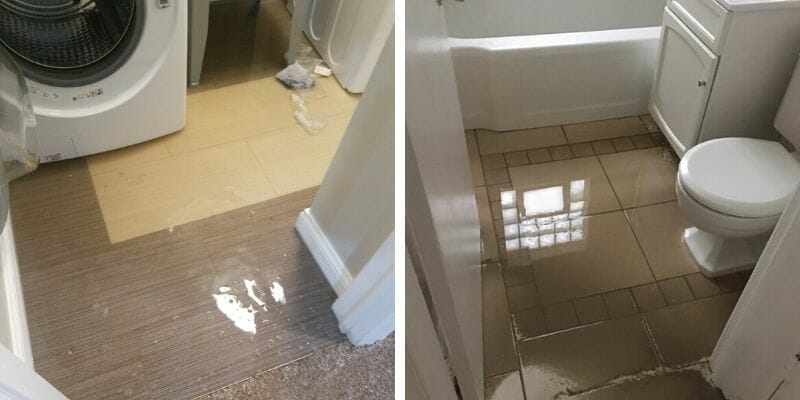The drips catch your attention right away. You look up and notice the apartment bathroom vent is leaking. Perhaps you spot trouble in the kitchen trickling down through an overhead light fixture.
Dealing with water damage in your apartment isn’t easy. It’s even harder when the source of the water is a ceiling leak from the upstairs apartment. This isn’t something you can fix by yourself.
Our restoration teams take care of apartment ceiling leak restoration and repair in Chicago, IL and the suburbs every single day. We’re the city’s largest water damage restoration provider, and we’ve seen it all.
Based on our years of experience, we offer this overview of the causes, do’s and don’ts and tips for handling everything.
What Causes Apartment Ceiling Leaks?
An upstairs unit is almost always the source of a leaking ceiling in the apartment below. However, damage can sometimes result from building-wide plumbing issues.
Let’s take a look at the most common reasons for water leaking through your apartment ceiling.
Problems in the Upstairs Apartment
- Leaky refrigerator water lines
- Broken dishwashers or disposals
- Overflowing sinks or bathtubs
- Clogged or backed-up toilets
- Leaking washers

Problems in the Building
- Frozen burst pipes
- Leaking air conditioning lines
- Broken fire sprinkler pipes
- Leaks in water heating systems
- General plumbing failures
How Bad Is Ceiling Leak Water Damage?
A leaky ceiling creates an unhealthy situation that needs immediate attention. Mopping up the water isn’t enough. A ceiling leak usually results in serious damage.

Soaked furniture and belongings are obvious, but you also have to be concerned about problems you can’t see.
• Water leaking from upstairs weakens the apartment ceiling.
• Damp settles deep into furniture cushions, padding and wood trim.
• Moisture in carpets seeps into flooring, wicks into drywall and warps baseboards.
• Mold growth takes hold and spreads within 24 hours of the initial damage.
How Do I Deal With a Ceiling Leak From Upstairs?
It’s important to take care of the situation and mitigate the water damage as quickly as possible. These do’s and don’ts help you stay on track regardless of how the leak started.
What You Should Do
• Do contact the landlord first about water leaking into your downstairs apartment from the above unit.
• Do check with the upstairs neighbors in case they don’t realize they have a water leak somewhere in their apartment.
• Do review your lease for specific details about tenant and landlord responsibilities for water damages.
• Do notify your renters insurance carrier, and ask for the name of an experienced water damage restoration company.
• Do take pictures documenting damages and potential losses before you start cleaning up.

What You Shouldn’t Do
• Don’t fail to alert other tenants if the leak affects the electricity or drips through a ceiling light fixture.
• Don’t be confrontational with the upstairs neighbors or the landlord, even if either party seems uncooperative.
• Don’t forget that you have legal rights as a tenant established and upheld by the state of Illinois.
Who Is Responsible for an Apartment Ceiling Leak?
How do you handle damages from an overhead water leak in the apartment? Who is responsible? Sorting everything out is similar to resolving water damages in a condo with several important differences.
While the tenants upstairs are responsible for accidents like an overflowing bathtub, they might not be liable for plumbing problems in their apartment. The property manager is obligated to maintain individual units and keep the building’s water system in good working condition.
If water damage in your apartment ceiling occurs because upstairs neighbors ignore clogged sinks, they neighbors are responsible. If the damage is a result of shoddy building maintenance, the landlord is responsible.
Sorting it all out can get complicated. When there doesn’t seem to be a straightforward solution, let your insurance company work out the details.
Does Renters Insurance Cover the Damage?
Talk to your insurance agent about water damage coverage details. Your belongings and furnishings should be covered by your policy. The neighbors upstairs may or may not be responsible for the leak, but that shouldn’t affect your coverage.

Your insurance carrier has the legal right to subrogation. This means that the company can seek to recoup its loss if the upstairs tenants or building owners are determined liable for damages. Once your claim is approved, your insurance carrier might take this additional course of action.
In the rare case of an apartment ceiling leaking from rain, traditional renters insurance doesn’t cover your loss. Water damage caused by a natural flooding event can be covered by purchasing a separate flood insurance policy.
Should I Call a Professional Water Damage Restoration Company?
When your apartment is flooded from upstairs, the damage drips down on everything. A ceiling leak can soak furniture, clothes, electronics and appliances. Even belongings like photos, books and important papers are at risk.

Maximize your recovery by bringing in a water damage contractor. These are just a few of the benefits of letting industry-certified technicians take care of the job.
• Technicians clean, sanitize and restore everything, including carpets, furniture and personal belongings.
• A specialized drying process ensures your apartment doesn’t develop future moisture-related problems.
• Mold removal and remediation eliminates the threat of unhealthy fungal growth in affected materials.
• Restoration staff sorts through insurance details and assists in determining responsibility and filing your claim.
Dealing With a Ceiling Water Leak in Your Chicago Apartment? We Can Help
Water leaking from the upstairs apartment always means trouble. We’re always here for you 24/7 with a complete line of remediation and restoration services. Our teams specialize in ceiling water damage repair for Chicago residents, and we cover the suburbs too.
When you need expert help right away, call us first here at ServiceMaster Restoration by Zaba: 773-647-1985
Yes. Mold begins to grow in ceiling tiles and surrounding materials within 24 hours of initial damage. It quickly spreads even after the leak is repaired.
Yes. Water in the ceiling can cause it to collapse. It can also damage surrounding supporting structure. A ceiling leak can cause serious problems with wiring and light fixtures.
It depends on the work involved in fixing the leak, restoring damaged materials and remediating mold growth.
The post Dealing with a Ceiling Leak From the Upstairs Apartment? What You Need to Know appeared first on ServiceMaster Restoration by Zaba.
source https://www.servicemasterbyzaba.com/blog/ceiling-leaking-upstairs-apartment/
No comments:
Post a Comment